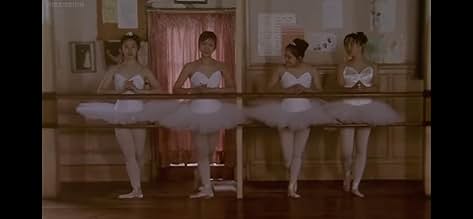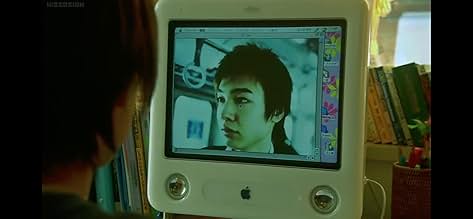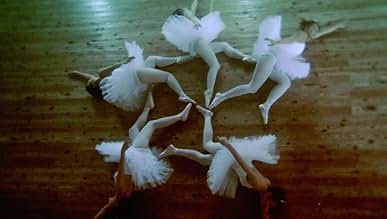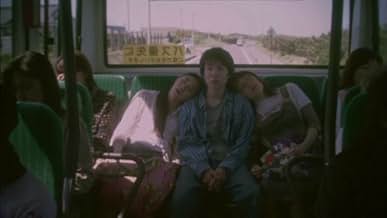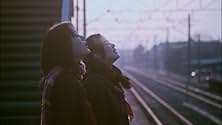Hana to Arisu
- 2004
- 2h 15min
CALIFICACIÓN DE IMDb
7.2/10
5.2 k
TU CALIFICACIÓN
Cuando dos mejores amigas se enamoran del mismo chico, desarrollan un plan para engañarlo y que salga con ellas.Cuando dos mejores amigas se enamoran del mismo chico, desarrollan un plan para engañarlo y que salga con ellas.Cuando dos mejores amigas se enamoran del mismo chico, desarrollan un plan para engañarlo y que salga con ellas.
- Dirección
- Guionista
- Elenco
- Premios
- 1 premio ganado en total
- Dirección
- Guionista
- Todo el elenco y el equipo
- Producción, taquilla y más en IMDbPro
Opiniones destacadas
After the dark world of _All About Lily Chou Chou_ in which junior high kids are involved in prostitution, extortion, and murder, Iwai returns with _Hana and Alice_, a film that brings the audience to the tried and true theme of the love triangle. This time involving the young trio of Hana, Alice, and Masashi.
The story begins with the friends Hana, acted by Suzuki Anne, _Returner_, _9 Souls_, and Alice, Aoi Yu, _All About Lily Chou Chou_, _Harmful Insect_, crossing frozen fields to a distant train station. There, Alice shows Hana the object of her affection: a tall Japanese-American. The two girls ride the the train many times. Even taking secret photographs of biracial young man and a younger student who they assume is his half-brother.
However, eventually, Alice's crush is gone and only the younger man, whose nose is always in a book, rides the train. Alice is heartbroken, But Hana continues riding the train, affection for the young man growing in her heart.
When high school begins, Hana joins the Rakugo club because her crush, Miyamoto Masashi, is also a member of the club. One day, while following her crush, Hana witnesses Masashi hits his head hard on a garage door knocking him to the ground. Hana rushes up to him and asks him if he is okay. Masashi begins reciting some of his rakugo lines and is convinced that he is okay, but Hana asks him if he remembers her. On this he is not so clear, Hana then states that she is his girlfriend. This of course shocks Masashi and so begins the process of Masashi trying to recover from an amnesia created by the lovesick Hana.
I was worried by the premise of this film at first, because it has been done a number of times before. However, I should have had more faith in Iwai Shunji. This is truly a good film and it really tugs on the heart strings. Those of us who have had our love for someone else non-reciprocated while definitely be touched. The acting is well done. Especially that of Aoi Yu who played Tsuda Shiori, the young girl forced to be a prostitute in _Lily Chou Chou_. The music, as always, is very nice, and this time it was actually composed by Iwai Shunji.
The story begins with the friends Hana, acted by Suzuki Anne, _Returner_, _9 Souls_, and Alice, Aoi Yu, _All About Lily Chou Chou_, _Harmful Insect_, crossing frozen fields to a distant train station. There, Alice shows Hana the object of her affection: a tall Japanese-American. The two girls ride the the train many times. Even taking secret photographs of biracial young man and a younger student who they assume is his half-brother.
However, eventually, Alice's crush is gone and only the younger man, whose nose is always in a book, rides the train. Alice is heartbroken, But Hana continues riding the train, affection for the young man growing in her heart.
When high school begins, Hana joins the Rakugo club because her crush, Miyamoto Masashi, is also a member of the club. One day, while following her crush, Hana witnesses Masashi hits his head hard on a garage door knocking him to the ground. Hana rushes up to him and asks him if he is okay. Masashi begins reciting some of his rakugo lines and is convinced that he is okay, but Hana asks him if he remembers her. On this he is not so clear, Hana then states that she is his girlfriend. This of course shocks Masashi and so begins the process of Masashi trying to recover from an amnesia created by the lovesick Hana.
I was worried by the premise of this film at first, because it has been done a number of times before. However, I should have had more faith in Iwai Shunji. This is truly a good film and it really tugs on the heart strings. Those of us who have had our love for someone else non-reciprocated while definitely be touched. The acting is well done. Especially that of Aoi Yu who played Tsuda Shiori, the young girl forced to be a prostitute in _Lily Chou Chou_. The music, as always, is very nice, and this time it was actually composed by Iwai Shunji.
The base layer here is teenage romance tweaked a little to frame episodes of ordinary life. Two schoolgirls fall in love with an aloof boy who believes he suffers from amnesia.
Annotating this is Celine and Julie Go Boating, which was about two girls embarking upon dreamlike adventure and mischief around modern Paris. What was so remarkable about it were precisely the elusive controls: the film didn't give out that we were, in fact, daydreaming until we were too far in to know exactly where. The clue was already laid out in the first scene, a cat of mysterious eyes and a peculiar chase through empty streets.
So you will have to pay attention to the opening scenes of Iwai's film, echoing this. Once again a chase in and out of subway cars as giggly play between the two girls. The other clue is obvious enough: Alice.
This layer borrows Rivette's whimsical light structure. Roles, guises, fiction, synchronous games about the fabrication of narratives, in our case centered at this boy who remembers nothing, is empty space, a blank stage, and the plays the girls assemble around him. He's told he was in love with one, then both. They both act parts, fashion entire pasts and emotions.
So love as this game of fiction, and getting to allow to be seduced by an image. This is excellent work, and in how it's subtly acknowledged inside the film: one girl signs up for a drama class, and has in fact done so to be close to the boy, himself an actor, the other is randomly approached on the street to model for TV commercials - and this may well reference Mikio Naruse's wonderful Street without Return from '34.
So the third layer is how the play is going to be resolved on a level behind the base narrative of ordinary life, and into the stage where love is the heightened game of duplicity.
One ploy is simple enough, opening day for the school play both girl and boy were rehearsing and a near-perfect rendition of the mechanisms that give rise to images: out on the stage performance, roles, fiction consumed as real, and backstage the internal machinations of tortured soul. The other is a little more intricate because of how unassuming: Alice auditions for a part in TV commercial.
Now so far this is no different than a French film. Notice what Iwai does, an extra layer that is deeply Japanese. Now the Japanese idea of high beauty and by extension performance, what is often perceived as quaint reticence, is formless heart expressed in visible form. Meditation.
But even a patriarch of Chan like Hongren could not so simply gauge his pupils' inner heart when the time came to decide for a succesor. What he asked instead, was that they write poems on a wall about it. This is a frequent practice in Buddhism. Painting a cycle will do, an 'ensho' meaning awareness. The hand will tell.
Now all through the film Hana has secretly contrived to cling to her object of desire, has lied and deceived. But when it comes to expressing inner self, we note that she is, in fact, a bad actress. Iwai intercuts her melodramatic reactions backstage with the actor's mock-mannerisms out on the stage. The auditorium is empty when she finally gets out for her part.
On the other hand Alice. She has been part of the ploy but with a certain affection for the part and with genuine feelings. So much so that it slipped from her, a bad actress in terms of the conventional drama of the world. We trust however that even though the image is false, she's moved to it truthfully. Her audition is to play an image on a screen. Instead the director decides on a whim that he wants her to do a ballet dance as per her resume, and in a short skirt, an almost humiliating prospect. What does she do? Channeling true self into the thing, she amazes with her skills.
So what do we get, between these two girls? Flowers in the sky, Hana meaning flower, reflecting Zen Master Dogen's notions of illusory mind images.
And on the other hand, the subtlest difference. Emptiness in full bloom. Or in the words of Dogen: being one with just this, while being free from just this.
Something to meditate upon.
Annotating this is Celine and Julie Go Boating, which was about two girls embarking upon dreamlike adventure and mischief around modern Paris. What was so remarkable about it were precisely the elusive controls: the film didn't give out that we were, in fact, daydreaming until we were too far in to know exactly where. The clue was already laid out in the first scene, a cat of mysterious eyes and a peculiar chase through empty streets.
So you will have to pay attention to the opening scenes of Iwai's film, echoing this. Once again a chase in and out of subway cars as giggly play between the two girls. The other clue is obvious enough: Alice.
This layer borrows Rivette's whimsical light structure. Roles, guises, fiction, synchronous games about the fabrication of narratives, in our case centered at this boy who remembers nothing, is empty space, a blank stage, and the plays the girls assemble around him. He's told he was in love with one, then both. They both act parts, fashion entire pasts and emotions.
So love as this game of fiction, and getting to allow to be seduced by an image. This is excellent work, and in how it's subtly acknowledged inside the film: one girl signs up for a drama class, and has in fact done so to be close to the boy, himself an actor, the other is randomly approached on the street to model for TV commercials - and this may well reference Mikio Naruse's wonderful Street without Return from '34.
So the third layer is how the play is going to be resolved on a level behind the base narrative of ordinary life, and into the stage where love is the heightened game of duplicity.
One ploy is simple enough, opening day for the school play both girl and boy were rehearsing and a near-perfect rendition of the mechanisms that give rise to images: out on the stage performance, roles, fiction consumed as real, and backstage the internal machinations of tortured soul. The other is a little more intricate because of how unassuming: Alice auditions for a part in TV commercial.
Now so far this is no different than a French film. Notice what Iwai does, an extra layer that is deeply Japanese. Now the Japanese idea of high beauty and by extension performance, what is often perceived as quaint reticence, is formless heart expressed in visible form. Meditation.
But even a patriarch of Chan like Hongren could not so simply gauge his pupils' inner heart when the time came to decide for a succesor. What he asked instead, was that they write poems on a wall about it. This is a frequent practice in Buddhism. Painting a cycle will do, an 'ensho' meaning awareness. The hand will tell.
Now all through the film Hana has secretly contrived to cling to her object of desire, has lied and deceived. But when it comes to expressing inner self, we note that she is, in fact, a bad actress. Iwai intercuts her melodramatic reactions backstage with the actor's mock-mannerisms out on the stage. The auditorium is empty when she finally gets out for her part.
On the other hand Alice. She has been part of the ploy but with a certain affection for the part and with genuine feelings. So much so that it slipped from her, a bad actress in terms of the conventional drama of the world. We trust however that even though the image is false, she's moved to it truthfully. Her audition is to play an image on a screen. Instead the director decides on a whim that he wants her to do a ballet dance as per her resume, and in a short skirt, an almost humiliating prospect. What does she do? Channeling true self into the thing, she amazes with her skills.
So what do we get, between these two girls? Flowers in the sky, Hana meaning flower, reflecting Zen Master Dogen's notions of illusory mind images.
And on the other hand, the subtlest difference. Emptiness in full bloom. Or in the words of Dogen: being one with just this, while being free from just this.
Something to meditate upon.
Hana and Alice are good friends and they do everything together. They go to the same high school and they go to school together. One day Hana falls in love with a boy who goes to the same high school. Hana deceives the boy and gets him. However, the boy loves Alice and Alice also loves him. What will happen to the relationship of the three.
I have a lot of friends but I don't have friends like Hana and Alice. They are always together and they say everything each other. They look happy and I think it is good thing. However friends sometimes become rivals. In this movie, Hana and Alice love the same man and they become rivals each other. I think moderate distance is important. We can share glad feeling or sad experience with our friends, but not interfere deeply. By watching this movie, we can rethink about the relationships with our friends.
I have a lot of friends but I don't have friends like Hana and Alice. They are always together and they say everything each other. They look happy and I think it is good thing. However friends sometimes become rivals. In this movie, Hana and Alice love the same man and they become rivals each other. I think moderate distance is important. We can share glad feeling or sad experience with our friends, but not interfere deeply. By watching this movie, we can rethink about the relationships with our friends.
Iwai's tale of friendship and love among 15-year-olds is a bitter-sweet affair, joyous and poignant in fragments. It is not a perfect film, but still imbued with enough of Iwai's visual flair and inventiveness to raise it above much of what Japan has offered up in the first decade of the 21st century.
Hana (Anne Suzuki) is inadvertently brought to Ma-kun by her best friend Alice (Yû Aoi). She utilizes an accident to convince clumsy Ma-kun (Tomohiro Kaku) that he has lost his memory and that she is the love of his life. The lie grows out of control, and sucks in the best friend. Alice, meanwhile, has her own troubles to contend with, namely an eccentric mother, disinterested father, and an acting/modeling opportunity that continually misfires.
Like Iwai's 'Love Letter', the essentials of the plot are intricately laid out, but ultimately matter less than the shot-by-shot, scene-by-scene poetry conjured up by camera, light and direction. There is one breathtaking shot in a classroom, when Astro Boy is revealed watching brazenly over a lover's tiff. The manga motif serves to underline the heightened emotions and extreme dramatics of the tale. Similar optical playfulness is employed when Hana watches Ma-kun on the train, seemingly in conversation with his girlfriend. That shot is matched later when we are optically fooled into thinking Ma-kun will kiss Alice. It is this continual ability to surprise and delight that means the 2-hour plus running time, while self-indulgent, manages not to feel too much of an imposition.
There are some wonderful set pieces to celebrate here. Alice's father making a complete mess of gifting his daughter a fountain pen is painful and hilarious. Ditto Hana's mother appearing in her undies before a shell-shocked Ma-kun. A klutzy classmate's photos of the girls in ballet tutus turn out to be magical. These scenes, stagy and contrived in the hands of a lesser mortal, are fluid, vivid and delightful when presented by Iwai.
It is testament to Iwai's genius that a host of A-listers line up for walk-on parts in this film. For example, Hirsohi Abe, used to playing leads, is practically an extra here when he shows up as the boyfriend of Alice's mum. What other living director elicits such reverence? Hana and Alice glows, quite literally. The film captures that vividness of passionate friendships and love first encountered that only the qualia of a 15-year-old knows. Ultimately, the running time is a shade too flabby to count it among Iwai's masterpieces (the plural is deliberate), but this is a subtle, complex film worthy of repeat viewing.
Hana (Anne Suzuki) is inadvertently brought to Ma-kun by her best friend Alice (Yû Aoi). She utilizes an accident to convince clumsy Ma-kun (Tomohiro Kaku) that he has lost his memory and that she is the love of his life. The lie grows out of control, and sucks in the best friend. Alice, meanwhile, has her own troubles to contend with, namely an eccentric mother, disinterested father, and an acting/modeling opportunity that continually misfires.
Like Iwai's 'Love Letter', the essentials of the plot are intricately laid out, but ultimately matter less than the shot-by-shot, scene-by-scene poetry conjured up by camera, light and direction. There is one breathtaking shot in a classroom, when Astro Boy is revealed watching brazenly over a lover's tiff. The manga motif serves to underline the heightened emotions and extreme dramatics of the tale. Similar optical playfulness is employed when Hana watches Ma-kun on the train, seemingly in conversation with his girlfriend. That shot is matched later when we are optically fooled into thinking Ma-kun will kiss Alice. It is this continual ability to surprise and delight that means the 2-hour plus running time, while self-indulgent, manages not to feel too much of an imposition.
There are some wonderful set pieces to celebrate here. Alice's father making a complete mess of gifting his daughter a fountain pen is painful and hilarious. Ditto Hana's mother appearing in her undies before a shell-shocked Ma-kun. A klutzy classmate's photos of the girls in ballet tutus turn out to be magical. These scenes, stagy and contrived in the hands of a lesser mortal, are fluid, vivid and delightful when presented by Iwai.
It is testament to Iwai's genius that a host of A-listers line up for walk-on parts in this film. For example, Hirsohi Abe, used to playing leads, is practically an extra here when he shows up as the boyfriend of Alice's mum. What other living director elicits such reverence? Hana and Alice glows, quite literally. The film captures that vividness of passionate friendships and love first encountered that only the qualia of a 15-year-old knows. Ultimately, the running time is a shade too flabby to count it among Iwai's masterpieces (the plural is deliberate), but this is a subtle, complex film worthy of repeat viewing.
In recent years, Japanese director Shunji Iwai has become the dark poet of adolescence, exhibiting a profound insight into how teenagers think and act, capturing the rhythms of their speech and depicting their not always smooth transitions from being a child to becoming an adult. Iwai's bleak 2001 film All About Lily Chou Chou dramatized the isolation and emotional torment that accompanies teenage bullying and the failure of modern technology to provide an outlet for loneliness. The polar opposite is Hana and Alice, his 2004 film just released on DVD, which shows the sweet, perhaps too innocent side of Japanese high school life without any hint of the turbulence displayed in Lily.
Written and directed by Iwai who also composed the musical score, Hana and Alice is a charming comedy/drama of friendship and conflict between two junior high school girls who fall for the same boy, depicting their gradually developing ability to handle complex emotional situations without the typical coming-of-age clichés. Originally filmed as three shorts for a candy commercial, Hana (Anne Suzuki) and Alice (Yu Aoi) are fifteen year old high school students and best friends. Alice is the more free-spirited and creative of the two, while Hana is more reserved but still quite playful. The two go to school each morning on the train, attend the same ballet classes, and are virtually inseparable.
On the train, they both notice a handsome student, Miyamoto (Tomohiro Kaku), traveling with a tall American-looking boy who they guess is his older brother. Hana, pursuing her new interest, joins the school drama club where Miyamoto just happens to be a member. Following him home after school, Hana watches in horror as Miyamoto, his head buried deep in a book and seemingly oblivious to the world around him, walks headfirst into a garage door and is knocked unconscious. Seizing the opportunity after coming to his aid, she tells him that his accident has caused him to forget that she is his girlfriend. She solicits Alice's help in pretending to be his ex-girl friend but the more convoluted the lies become, the more strain is put on the girls' relationship, especially when Alice develops strong romantic feelings for Miyamoto.
Hana and Alice is a beautifully filmed and often very funny film that features gorgeous cinematography by the late Noburu Shinoda, magnificent music and ballet sequences, and brilliant performances by Aoi, Suzuki, and Kaku. The film has many memorable moments including an enchanting five-minute ballet sequence, a tearful confession by Hana minutes before she is to go on stage to perform, a glowing photo shoot of the ballet class outside at night, a fight on the beach between the two girls, and Alice's loving visit with her estranged father. While the story is thin and feels stretched over 135 minutes, Iwai's subtle delineation of character and insight into adolescent life makes Hana and Alice a film to cherish.
Written and directed by Iwai who also composed the musical score, Hana and Alice is a charming comedy/drama of friendship and conflict between two junior high school girls who fall for the same boy, depicting their gradually developing ability to handle complex emotional situations without the typical coming-of-age clichés. Originally filmed as three shorts for a candy commercial, Hana (Anne Suzuki) and Alice (Yu Aoi) are fifteen year old high school students and best friends. Alice is the more free-spirited and creative of the two, while Hana is more reserved but still quite playful. The two go to school each morning on the train, attend the same ballet classes, and are virtually inseparable.
On the train, they both notice a handsome student, Miyamoto (Tomohiro Kaku), traveling with a tall American-looking boy who they guess is his older brother. Hana, pursuing her new interest, joins the school drama club where Miyamoto just happens to be a member. Following him home after school, Hana watches in horror as Miyamoto, his head buried deep in a book and seemingly oblivious to the world around him, walks headfirst into a garage door and is knocked unconscious. Seizing the opportunity after coming to his aid, she tells him that his accident has caused him to forget that she is his girlfriend. She solicits Alice's help in pretending to be his ex-girl friend but the more convoluted the lies become, the more strain is put on the girls' relationship, especially when Alice develops strong romantic feelings for Miyamoto.
Hana and Alice is a beautifully filmed and often very funny film that features gorgeous cinematography by the late Noburu Shinoda, magnificent music and ballet sequences, and brilliant performances by Aoi, Suzuki, and Kaku. The film has many memorable moments including an enchanting five-minute ballet sequence, a tearful confession by Hana minutes before she is to go on stage to perform, a glowing photo shoot of the ballet class outside at night, a fight on the beach between the two girls, and Alice's loving visit with her estranged father. While the story is thin and feels stretched over 135 minutes, Iwai's subtle delineation of character and insight into adolescent life makes Hana and Alice a film to cherish.
¿Sabías que…?
- TriviaAlthough released almost 11 years before Hana to Arisu satsujin jiken (2015), this movie actually serves as the sequel.
- Citas
Setsuko "Alice" Arisugawa: I saw 'Hannibal' on satellite last night.
Hana: So did I.
Setsuko "Alice" Arisugawa: I was scared.
Hana: Isn't he creepy?
Setsuko "Alice" Arisugawa: Yeah. Don't you think real people are scarier... than zombies and ghosts?
- ConexionesFeatures Taiyô no ôji: Horusu no daibôken (1968)
Selecciones populares
Inicia sesión para calificar y agrega a la lista de videos para obtener recomendaciones personalizadas
- How long is Hana and Alice?Con tecnología de Alexa
Detalles
Taquilla
- Total a nivel mundial
- USD 654,448
Contribuir a esta página
Sugiere una edición o agrega el contenido que falta

